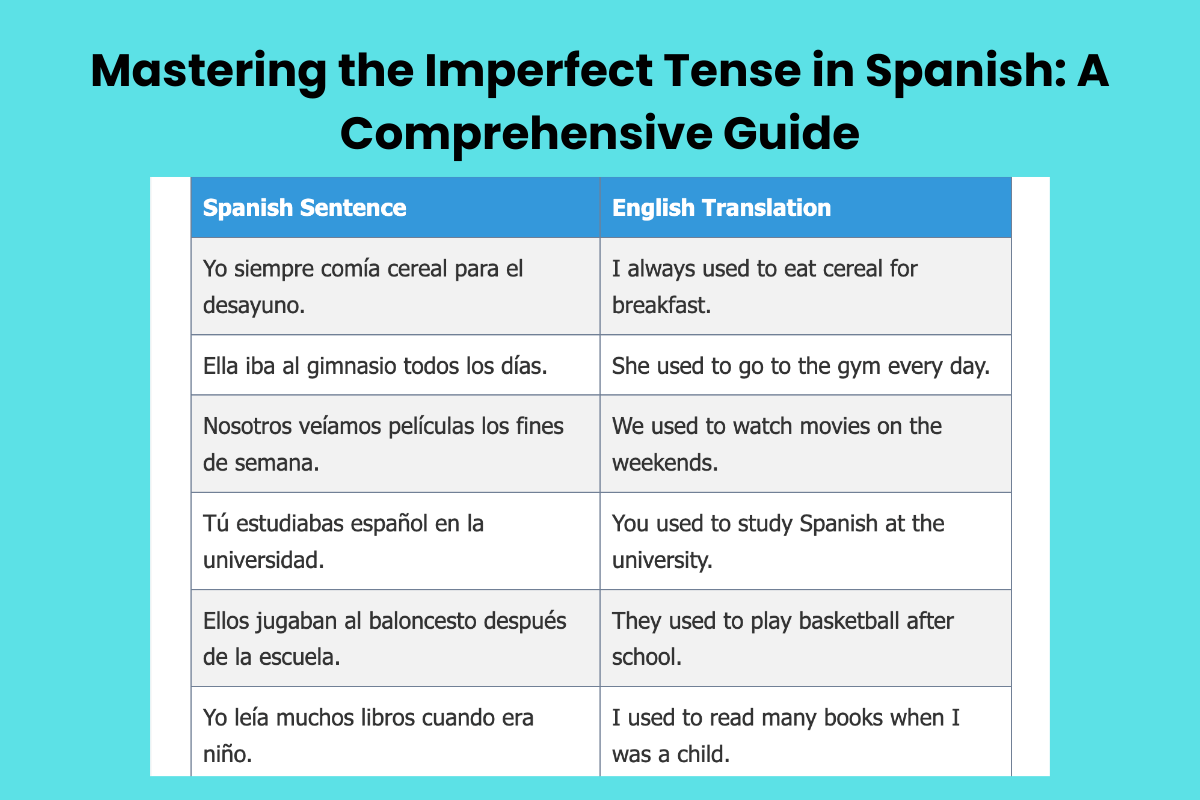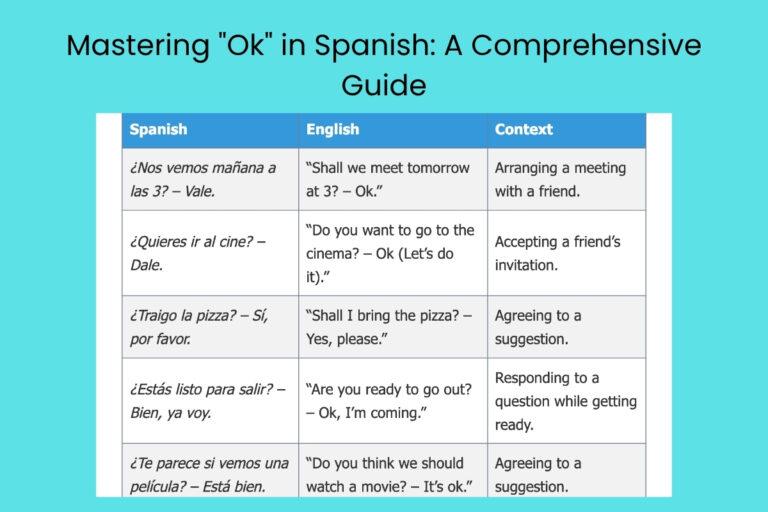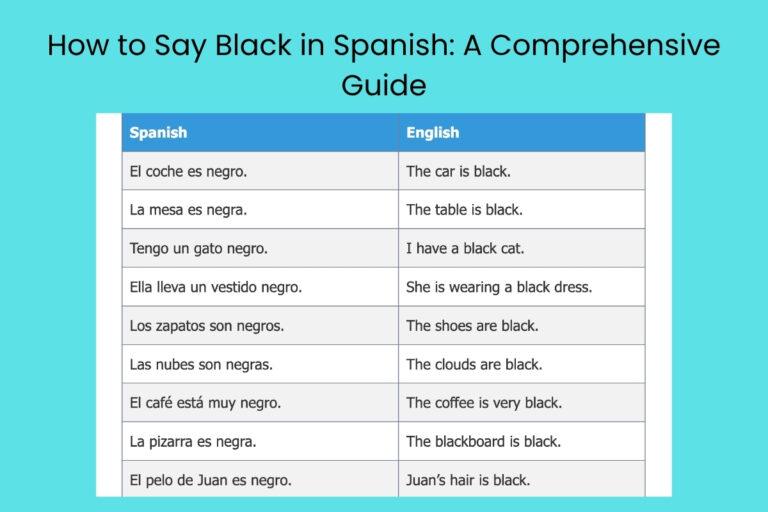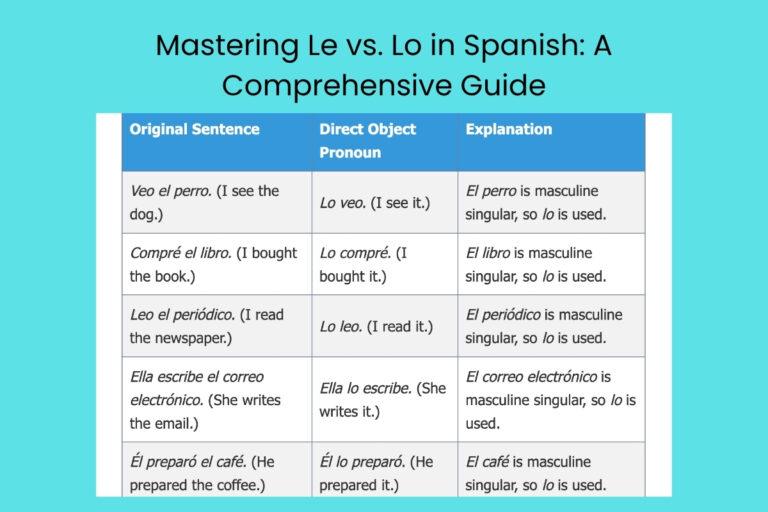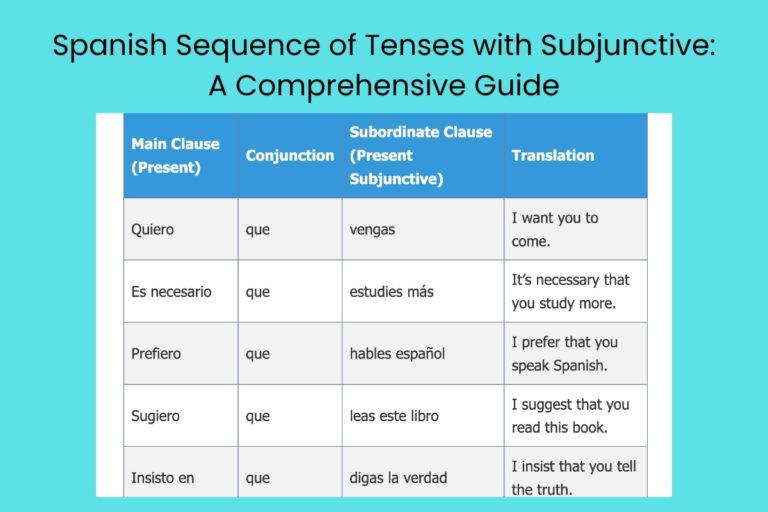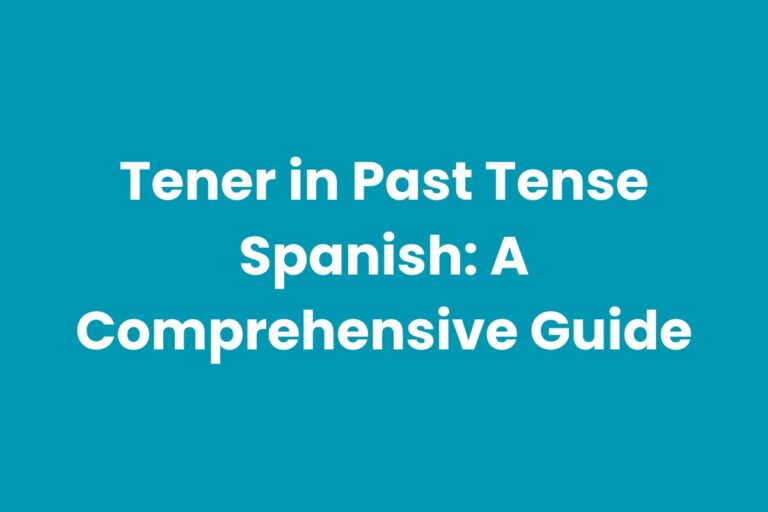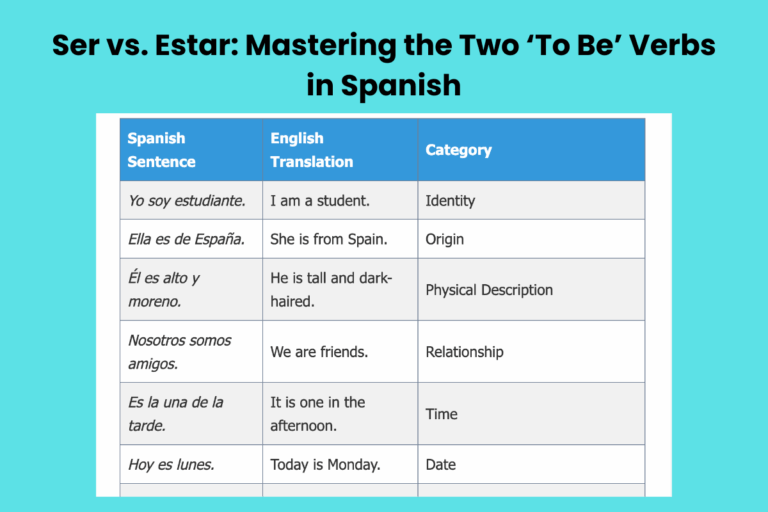Mastering the Imperfect Tense in Spanish: A Comprehensive Guide
The Spanish imperfect tense, or pretérito imperfecto, is a cornerstone of expressing past actions, descriptions, and states of being. Unlike the preterite tense, which focuses on completed actions, the imperfect tense paints a picture of ongoing or habitual events in the past. Understanding the imperfect tense is crucial for narrating stories, describing past environments, and conveying nuanced meanings in Spanish. This guide is designed for learners of all levels, from beginners establishing foundational skills to advanced students seeking mastery. By delving into the structure, usage, and common pitfalls of the imperfect tense, you’ll gain the confidence to communicate more effectively and accurately in Spanish.
Table of Contents
- Introduction
- Definition of the Imperfect Tense
- Structural Breakdown
- Types and Categories of Usage
- Examples of the Imperfect Tense
- Usage Rules
- Common Mistakes
- Practice Exercises
- Advanced Topics
- FAQ
- Conclusion
Definition of the Imperfect Tense
The imperfect tense in Spanish, known as the pretérito imperfecto or sometimes the copretérito, is a past tense used to describe actions, conditions, or events that were ongoing, habitual, or repeated in the past. It does not specify when the action began or ended, focusing instead on the process or state of being. The imperfect tense contrasts with the preterite tense, which is used for completed actions with a definite beginning and end.
The primary function of the imperfect tense is to provide background information, set the scene, or describe circumstances surrounding a past event. It’s often used to talk about what used to happen, what was happening, or what someone was like in the past.
The imperfect tense is classified as a past indicative tense, meaning it expresses a factual or real action in the past. It’s essential for storytelling, describing past routines, and expressing states of being that existed over a period of time.
Structural Breakdown
The imperfect tense is formed by adding specific endings to the stem of the verb. The stem is obtained by removing the -ar, -er, or -ir ending from the infinitive form. There are only three irregular verbs in the imperfect tense, making it relatively straightforward to learn.
Regular Verb Conjugations
Regular verbs follow predictable patterns for conjugation in the imperfect tense. The endings differ based on whether the verb ends in -ar, -er, or -ir.
For -ar verbs, the endings are: -aba, -abas, -aba, -ábamos, -abais, -aban.
For -er and -ir verbs, the endings are the same: -ía, -ías, -ía, -íamos, -íais, -ían.
The following table illustrates the conjugation of regular verbs in the imperfect tense:
| Pronoun | Hablar (to speak) | Comer (to eat) | Vivir (to live) |
|---|---|---|---|
| Yo | Hablaba | Comía | Vivía |
| Tú | Hablabas | Comías | Vivías |
| Él/Ella/Usted | Hablaba | Comía | Vivía |
| Nosotros | Hablábamos | Comíamos | Vivíamos |
| Vosotros | Hablabais | Comíais | Vivíais |
| Ellos/Ellas/Ustedes | Hablaban | Comían | Vivían |
As you can see, the conjugation patterns are consistent and easy to memorize for regular verbs. With practice, you’ll be able to quickly form the imperfect tense of any regular verb.
Irregular Verb Conjugations
Fortunately, there are only three irregular verbs in the imperfect tense: ser (to be), ir (to go), and ver (to see). Their conjugations must be memorized.
Here are the conjugations of the irregular verbs:
| Pronoun | Ser (to be) | Ir (to go) | Ver (to see) |
|---|---|---|---|
| Yo | Era | Iba | Veía |
| Tú | Eras | Ibas | Veías |
| Él/Ella/Usted | Era | Iba | Veía |
| Nosotros | Éramos | Íbamos | Veíamos |
| Vosotros | Erais | Ibais | Veíais |
| Ellos/Ellas/Ustedes | Eran | Iban | Veían |
Notice that these verbs do not follow the regular -ar, -er, or -ir ending patterns. Memorizing these conjugations is essential for using the imperfect tense correctly.
Types and Categories of Usage
The imperfect tense is used in various contexts to express different nuances of past actions and states. Understanding these different categories of usage will help you use the imperfect tense more effectively.
Habitual Actions
The imperfect tense is used to describe actions that were performed repeatedly or habitually in the past. This is often translated as “used to” or “would” in English.
For example, “Yo jugaba al fútbol todos los días” means “I used to play soccer every day” or “I would play soccer every day.”
Descriptions in the Past
The imperfect tense is used to describe people, places, or things in the past. This includes physical descriptions, personality traits, and general characteristics.
For example, “La casa era grande y tenía un jardín hermoso” means “The house was big and had a beautiful garden.”
Simultaneous Actions
The imperfect tense is used to describe two or more actions that were happening at the same time in the past. This creates a sense of ongoing activity and background context.
For example, “Mientras yo cocinaba, mi hermano leía un libro” means “While I was cooking, my brother was reading a book.”
Age in the Past
The imperfect tense of the verb tener (to have) is used to express someone’s age in the past.
For example, “Cuando era niño, tenía cinco años” means “When I was a child, I was five years old.”
Time and Weather
The imperfect tense is used to describe the time and weather conditions in the past. This sets the scene and provides context for other events.
For example, “Eran las tres de la tarde y hacía mucho calor” means “It was three in the afternoon and it was very hot.”
Emotional States
The imperfect tense is used to describe emotional states or feelings that someone had in the past. This conveys a sense of duration and ongoing emotion.
For example, “Estaba muy triste cuando me dijo adiós” means “I was very sad when he/she said goodbye to me.”
Examples of the Imperfect Tense
To further illustrate the different uses of the imperfect tense, let’s examine a variety of examples organized by category.
Habitual Actions Examples
The following table provides examples of sentences using the imperfect tense to describe habitual actions in the past. Think of these as things that “used to” happen.
| Spanish Sentence | English Translation |
|---|---|
| Yo siempre comía cereal para el desayuno. | I always used to eat cereal for breakfast. |
| Ella iba al gimnasio todos los días. | She used to go to the gym every day. |
| Nosotros veíamos películas los fines de semana. | We used to watch movies on the weekends. |
| Tú estudiabas español en la universidad. | You used to study Spanish at the university. |
| Ellos jugaban al baloncesto después de la escuela. | They used to play basketball after school. |
| Yo leía muchos libros cuando era niño. | I used to read many books when I was a child. |
| Ella cantaba en el coro de la iglesia. | She used to sing in the church choir. |
| Nosotros viajábamos a Europa cada verano. | We used to travel to Europe every summer. |
| Tú visitabas a tus abuelos todos los domingos. | You used to visit your grandparents every Sunday. |
| Ellos comían paella todos los domingos. | They used to eat paella every Sunday. |
| Yo escuchaba música clásica todo el tiempo. | I used to listen to classical music all the time. |
| Ella escribía cartas a su amiga. | She used to write letters to her friend. |
| Nosotros nadábamos en la piscina todos los días. | We used to swim in the pool every day. |
| Tú corrías en el parque por la mañana. | You used to run in the park in the morning. |
| Ellos bailaban salsa en la discoteca. | They used to dance salsa at the disco. |
| Yo tocaba la guitarra en una banda. | I used to play the guitar in a band. |
| Ella dibujaba en su cuaderno durante la clase. | She used to draw in her notebook during class. |
| Nosotros cenábamos juntos todas las noches. | We used to have dinner together every night. |
| Tú bebías café por la tarde. | You used to drink coffee in the afternoon. |
| Ellos fumaban cigarros en el balcón. | They used to smoke cigarettes on the balcony. |
| Yo siempre llegaba tarde a clase. | I always used to arrive late to class. |
| Ella siempre se reía de mis chistes. | She always used to laugh at my jokes. |
| Nosotros siempre nos peleábamos de niños. | We always used to fight as children. |
These examples demonstrate how the imperfect tense is used to describe actions that were repeated regularly in the past, giving a sense of routine or habit.
Descriptive Examples
The following table provides examples of sentences using the imperfect tense to describe people, places, or things in the past.
| Spanish Sentence | English Translation |
|---|---|
| La casa era muy grande y antigua. | The house was very big and old. |
| El cielo estaba nublado y gris. | The sky was cloudy and gray. |
| Ella era una persona muy amable y generosa. | She was a very kind and generous person. |
| El coche era rojo y muy rápido. | The car was red and very fast. |
| La música era suave y relajante. | The music was soft and relaxing. |
| El jardín estaba lleno de flores. | The garden was full of flowers. |
| El libro era largo y aburrido. | The book was long and boring. |
| La comida era deliciosa y abundante. | The food was delicious and plentiful. |
| El profesor era inteligente y paciente. | The professor was intelligent and patient. |
| El clima era cálido y húmedo. | The weather was warm and humid. |
| La ciudad era ruidosa y concurrida. | The city was noisy and crowded. |
| El vestido era azul y elegante. | The dress was blue and elegant. |
| La playa era tranquila y solitaria. | The beach was quiet and solitary. |
| El restaurante era caro y exclusivo. | The restaurant was expensive and exclusive. |
| La película era emocionante y conmovedora. | The movie was exciting and moving. |
| La gente era amable y acogedora. | The people were friendly and welcoming. |
| El ambiente era festivo y alegre. | The atmosphere was festive and cheerful. |
| El trabajo era difícil y desafiante. | The job was difficult and challenging. |
| La situación era complicada y delicada. | The situation was complicated and delicate. |
| El problema era grave y urgente. | The problem was serious and urgent. |
| La solución era simple y efectiva. | The solution was simple and effective. |
| El resultado era sorprendente e inesperado. | The result was surprising and unexpected. |
These examples illustrate how the imperfect tense provides descriptive details, painting a picture of what things were like in the past.
Simultaneous Actions Examples
The following table provides examples of sentences using the imperfect tense to describe actions happening simultaneously in the past.
| Spanish Sentence | English Translation |
|---|---|
| Mientras yo estudiaba, mi hermana veía la televisión. | While I was studying, my sister was watching television. |
| Mientras él cocinaba, ella ponía la mesa. | While he was cooking, she was setting the table. |
| Mientras nosotros hablábamos, ellos escuchaban música. | While we were talking, they were listening to music. |
| Mientras tú trabajabas, yo descansaba. | While you were working, I was resting. |
| Mientras ellos jugaban, nosotros preparábamos la cena. | While they were playing, we were preparing dinner. |
| Mientras el sol brillaba, los pájaros cantaban. | While the sun was shining, the birds were singing. |
| Mientras la lluvia caía, yo leía un libro. | While the rain was falling, I was reading a book. |
| Mientras el viento soplaba, las hojas caían. | While the wind was blowing, the leaves were falling. |
| Mientras la gente bailaba, la banda tocaba música. | While the people were dancing, the band was playing music. |
| Mientras los niños reían, los padres conversaban. | While the children were laughing, the parents were conversing. |
| Mientras el tren llegaba, la gente esperaba en el andén. | While the train was arriving, the people were waiting on the platform. |
| Mientras el avión despegaba, los pasajeros miraban por la ventana. | While the plane was taking off, the passengers were looking out the window. |
| Mientras el barco navegaba, las olas rompían en la costa. | While the boat was sailing, the waves were breaking on the shore. |
| Mientras el fuego ardía, las llamas iluminaban la noche. | While the fire was burning, the flames illuminated the night. |
| Mientras la luna brillaba, las estrellas parpadeaban. | While the moon was shining, the stars were twinkling. |
| Mientras la ciudad dormía, los gatos vagaban por las calles. | While the city was sleeping, the cats were wandering the streets. |
| Mientras la nieve caía, los niños jugaban en el parque. | While the snow was falling, the children were playing in the park. |
| Mientras el café se enfriaba, yo pensaba en ti. | While the coffee was cooling down, I was thinking about you. |
| Mientras la radio sonaba, yo hacía las tareas del hogar. | While the radio was playing, I was doing the housework. |
| Mientras el reloj tic-tac, el tiempo pasaba lentamente. | While the clock ticked, time passed slowly. |
These examples illustrate how the imperfect tense can describe multiple actions unfolding at the same time, providing a rich and detailed picture of past events.
Age Examples
| Spanish Sentence | English Translation |
|---|---|
| Yo tenía diez años cuando fui a España. | I was ten years old when I went to Spain. |
| Ella tenía quince años cuando aprendió a conducir. | She was fifteen years old when she learned to drive. |
| Nosotros teníamos veinte años cuando nos conocimos. | We were twenty years old when we met. |
| Tú tenías cinco años cuando empezaste a ir a la escuela. | You were five years old when you started going to school. |
| Ellos tenían treinta años cuando se casaron. | They were thirty years old when they got married. |
Time and Weather Examples
| Spanish Sentence | English Translation |
|---|---|
| Eran las cinco de la tarde y hacía frío. | It was five in the afternoon and it was cold. |
| Era medianoche y llovía mucho. | It was midnight and it was raining a lot. |
| Eran las ocho de la mañana y el sol brillaba. | It was eight in the morning and the sun was shining. |
| Era la una de la tarde y hacía calor. | It was one in the afternoon and it was hot. |
| Eran las diez de la noche y había niebla. | It was ten at night and it was foggy. |
Emotional States Examples
| Spanish Sentence | English Translation |
|---|---|
| Estaba feliz de verte. | I was happy to see you. |
| Ella estaba triste porque su gato estaba enfermo. | She was sad because her cat was sick. |
| Nosotros estábamos emocionados por el viaje. | We were excited about the trip. |
| Tú estabas enojado por la situación. | You were angry about the situation. |
| Ellos estaban nerviosos antes del examen. | They were nervous before the exam. |
Usage Rules
Understanding the specific rules governing the use of the imperfect tense is crucial for accurate and effective communication in Spanish.
Ser vs. Estar in the Imperfect
Both ser and estar mean “to be,” but they are used in different contexts. In the imperfect tense, ser (era, eras, era, éramos, erais, eran) is used to describe inherent qualities, characteristics, or permanent conditions. Estar (estaba, estabas, estaba, estábamos, estabais, estaban) is used to describe temporary states, conditions, or locations.
For example: “Ella era alta” (She was tall – inherent quality). “Ella estaba cansada” (She was tired – temporary state).
Preterite vs. Imperfect
The preterite and imperfect tenses are both used to describe past actions, but they convey different meanings. The preterite is used for completed actions with a definite beginning and end, while the imperfect is used for ongoing, habitual, or descriptive actions in the past.
For example: “Ayer comí pizza” (Yesterday I ate pizza – completed action). “Antes comía pizza todos los días” (Before I used to eat pizza every day – habitual action).
Signal Words
Certain words and phrases often signal the use of the imperfect tense. These include: siempre (always), a menudo (often), generalmente (generally), normalmente (normally), todos los días (every day), cada semana (every week), mientras (while), cuando era niño (when I was a child), antes (before).
Recognizing these signal words can help you identify when to use the imperfect tense in a sentence.
Common Mistakes
Even experienced learners sometimes make mistakes with the imperfect tense. Here are some common errors and how to avoid them:
- Confusing preterite and imperfect: Using the preterite for ongoing or descriptive actions, or using the imperfect for completed actions.
- Incorrect: Yo comí pizza todos los días. (I ate pizza every day – implies a completed action each day)
- Correct: Yo comía pizza todos los días. (I used to eat pizza every day – habitual action)
- Incorrect verb conjugations: Using the wrong endings for regular or irregular verbs.
- Incorrect: Yo ser alto.
- Correct: Yo era alto. (I was tall)
- Misusing ser and estar: Using the wrong verb to describe a quality or state.
- Incorrect: Ella estaba alta.
- Correct: Ella era alta. (She was tall)
Practice Exercises
Test your understanding of the imperfect tense with these practice exercises.
Exercise 1: Conjugation
Conjugate the following verbs in the imperfect tense for the given pronouns.
| Pronoun | Verb (Infinitive) | Answer |
|---|---|---|
| Yo | Cantar (to sing) | |
| Tú | Vivir (to live) | |
| Él | Comer (to eat) | |
| Nosotros | Ser (to be) | |
| Vosotros | Ir (to go) | |
| Ellos | Hablar (to speak) | |
| Yo | Ver (to see) | |
| Tú | Estudiar (to study) | |
| Ella | Bailar (to dance) | |
| Nosotros | Trabajar (to work) |
Answers:
| Pronoun | Verb (Infinitive) | Answer |
|---|---|---|
| Yo | Cantar (to sing) | Cantaba |
| Tú | Vivir (to live) | Vivías |
| Él | Comer (to eat) | Comía |
| Nosotros | Ser (to be) | Éramos |
| Vosotros | Ir (to go) | Ibais |
| Ellos | Hablar (to speak) | Hablaban |
| Yo | Ver (to see) | Veía |
| Tú | Estudiar (to study) | Estudiabas |
| Ella | Bailar (to dance) | Bailaba |
| Nosotros | Trabajar (to work) | Trabajábamos |
Exercise 2: Fill in the Blanks
Fill in the blanks with the correct form of the verb in the imperfect tense.
| Sentence | Verb (Infinitive) | Answer |
|---|---|---|
| Cuando era niño, yo __________ (jugar) al fútbol. | Jugar (to play) | |
| Antes, ella __________ (vivir) en España. | Vivir (to live) | |
| Nosotros __________ (ir) al cine todos los viernes. | Ir (to go) | |
| Tú __________ (ser) muy simpático. | Ser (to be) | |
| Ellos __________ (comer) mucha carne. | Comer (to eat) | |
| Yo __________ (tener) mucho pelo cuando era joven. | Tener (to have) | |
| Ella __________ (estar) muy contenta con su nuevo trabajo. | Estar (to be) | |
| Nosotros __________ (querer) ir a la playa. | Querer (to want) | |
| Vosotros __________ (saber) mucho sobre historia. | Saber (to know) | |
| Ellos __________ (poder) hablar español muy bien. | Poder (to be able to) |
Answers:
| Sentence | Verb (Infinitive) | Answer |
|---|---|---|
| Cuando era niño, yo __________ (jugar) al fútbol. | Jugar (to play) | jugaba |
| Antes, ella __________ (vivir) en España. | Vivir (to live) | vivía |
| Nosotros __________ (ir) al cine todos los viernes. | Ir (to go) | íbamos |
| Tú __________ (ser) muy simpático. | Ser (to be) | eras |
| Ellos __________ (comer) mucha carne. | Comer (to eat) | comían |
| Yo __________ (tener) mucho pelo cuando era joven. | Tener (to have) | tenía |
| Ella __________ (estar) muy contenta con su nuevo trabajo. | Estar (to be) | estaba |
| Nosotros __________ (querer) ir a la playa. | Querer (to want) | queríamos |
| Vosotros __________ (saber) mucho sobre historia. | Saber (to know) | sabíais |
| Ellos __________ (poder) hablar español muy bien. | Poder (to be able to) | podían |
Exercise 3: Translation
Translate the following sentences into Spanish using the imperfect tense.
| English Sentence | Answer |
|---|---|
| I used to study French. | |
| She was very happy. | |
| We were going to the beach every summer. | |
| You were tall and handsome. | |
| They were playing in the park. |
Answers:
| English Sentence | Answer |
|---|---|
| I used to study French. | Yo estudiaba francés. |
| She was very happy. | Ella estaba muy feliz. |
| We were going to the beach every summer. | Nosotros íbamos a la playa cada verano. |
| You were tall and handsome. | Tú eras alto y guapo. |
| They were playing in the park. | Ellos jugaban en el parque. |
Advanced Topics
For those looking to deepen their understanding, here are some advanced topics related to the imperfect tense.
Imperfect Subjunctive
The imperfect subjunctive is used in dependent clauses to express hypothetical or uncertain actions or states in the past. It often follows verbs or expressions of doubt, desire, or emotion.
For example: “Quería que tú vinieras a mi fiesta” (I wanted you to come to my party).
Conditional Tense with Imperfect
The conditional tense is often used in conjunction with the imperfect subjunctive to express hypothetical situations in the past. The imperfect subjunctive sets the condition, and the conditional tense expresses the result.
For example: “Si tuviera dinero, viajaría por el mundo” (If I had money, I would travel the world).
FAQ
Here are some frequently asked questions about the imperfect tense in Spanish.
When should I use the imperfect tense instead of the preterite tense?
Use the imperfect tense for ongoing, habitual, or descriptive actions in the past. Use the preterite tense for completed actions with a definite beginning and end.
Are there any other irregular verbs in the imperfect tense besides ser, ir, and ver?
No, ser, ir, and ver are the only irregular verbs in the imperfect tense.
How can I improve my ability to use the imperfect tense correctly?
Practice regularly, pay attention to signal words, and focus on understanding the nuances of past actions and states.
Conclusion
The imperfect tense is a vital component of Spanish grammar, enabling you to express a wide range of past actions, descriptions, and states of being. By mastering its structure, usage, and common exceptions, you’ll significantly enhance your ability to communicate effectively and accurately in Spanish.
Keep practicing and exploring the nuances of the imperfect tense, and you’ll find yourself becoming more fluent and confident in your Spanish language skills.

